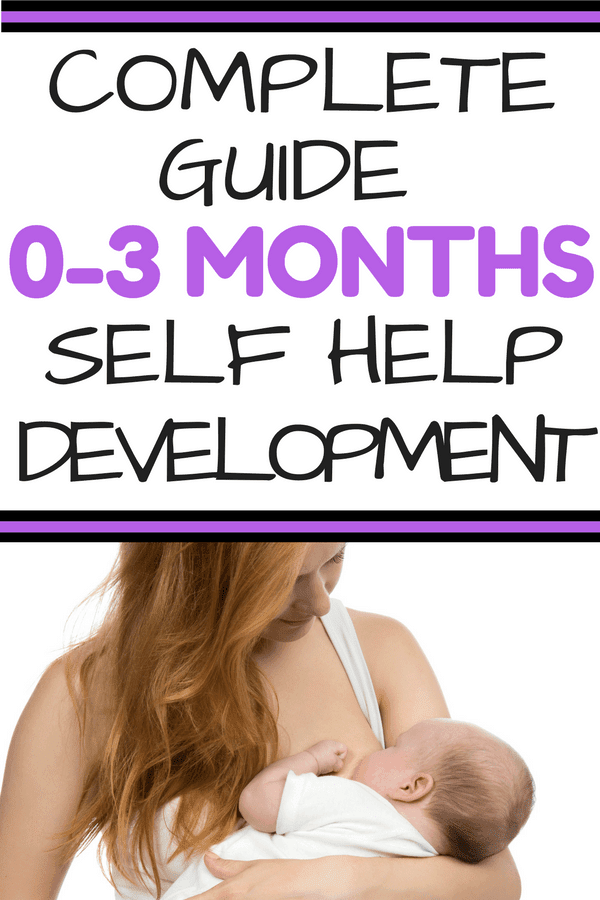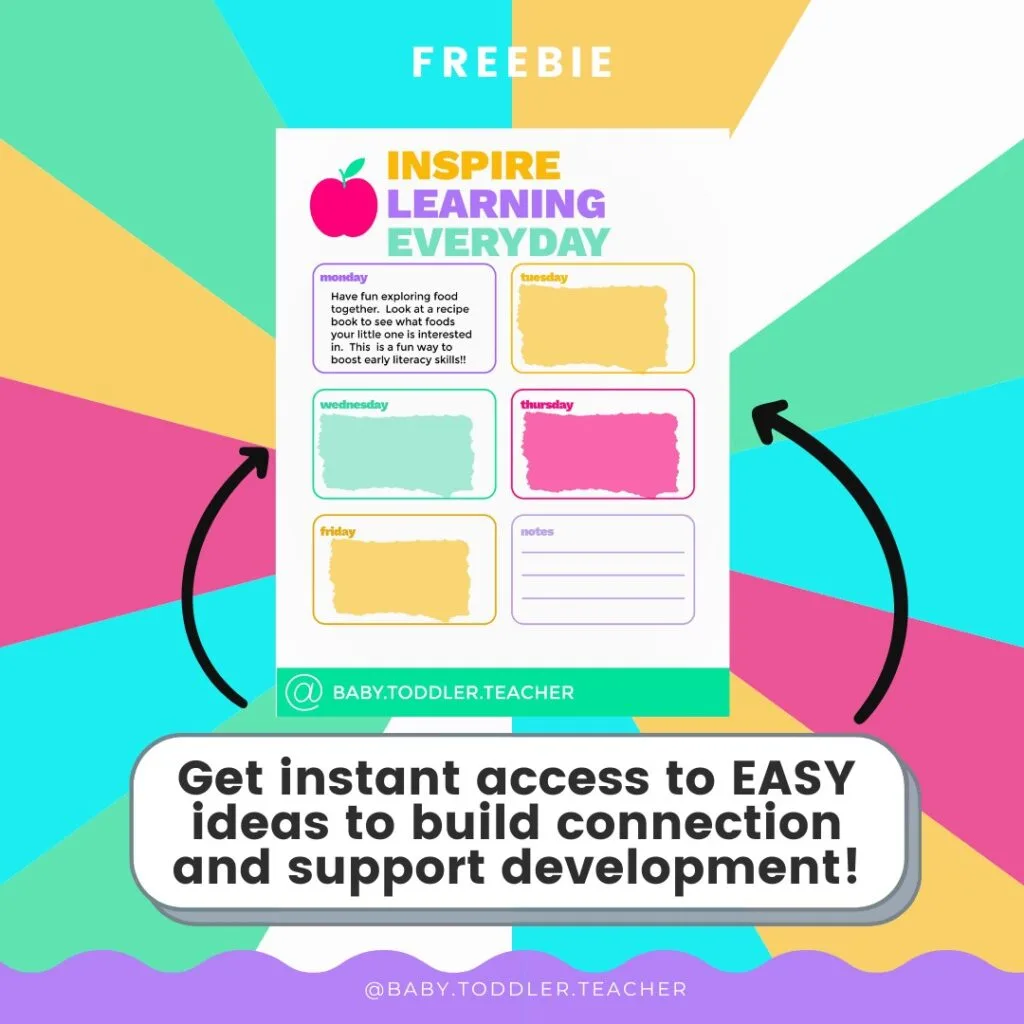Self Help Skills include those needed for your little one to someday become independent in their daily routines.
Your newborn may be a long way from that right now, but they are already showing signs that they are growing these skills from day one.
All children develop differently so know that if your baby is not doing the exact same things as another, that is ok.
However, if you are concerned about your little one’s development always seek out the Early Intervention program in your area for a free screening or evaluation.
Baby development in the first 3 months will change very quickly. You will notice your little one doing new things weekly and sometimes even daily!
Remember that your baby’s skills will change quickly.
One-month infant development skills will look completely different than their three-month development.
In this post, I will give you information about what 3-month development self-help skills look like and how to encourage these skills in babies from birth to three months.

(This post may contain affiliate links. To read our full disclosure policy click here.)
0-3 Months Development Self-Help Skills Include:
Self help skills are the ones that allow your child to become more independent in daily routines. These skills start in infancy as your baby learns to take milk from a breast or bottle, cry to indicate wants and needs, and by exploring their environment visually and physically.
How Your Baby Eats
In those first days of your baby’s life eating is one of the most important skills they gain!
Nursing or drinking from a bottle requires a lot of coordination for them as they need to breathe, suck, and swallow in order to take down milk or formula without issues.
If nursing, make sure to get into a spot that is comfortable so that you and your baby are relaxed.
Skin-to-skin contact is also a great way to encourage feeding and increase milk supply.
When bottle feeding, make sure that you have the right flow of nipple so that formula or milk does not come out too fast or too slow so your baby can eat efficiently.
If you are struggling with breastfeeding check out this guide on troubleshooting…you can grab it here.
If you continue to have difficulties with feeding seek out a lactation consultant or your pediatrician for help.

How Your Baby Sleeps
One of the big developmental milestones at 3 months expected is sleep! When your baby is first born they sleep a lot.
They cycle into different modes of sleep some are lighter and some are deeper.
You may notice in the lighter cycles of sleep your baby may move or change their facial expression.
As your baby grows their sleep will change as well.
Their sleep intervals will get longer as they settle into their sleeping, eating, and awake time routines.
Related Post: Top Tips on Getting Your Newborn to Sleep!
Bringing Hands to Their Mouth
Your baby is working on discovering their new favorite toy: Hands!
Their little fingers provide them with oral stimulation and your baby may also use them to soothe them-self ( this is a wonderful skill to have).
At the newborn stage, their hands will most likely be balled up into fists most of the time.
By month three you will see them begin to remain in a more open position (this is an important motor milestone as well.)
As they become more aware of their limbs and hands they will start to bring them up to their face to look at them and also explore them by putting their fingers in their mouth.
How Can I Encourage 0-3 Months self help Skills?
Watch Your Baby’s Cues
Get to know your little one by snuggling them close and watching for their cues.
Babies will tell you what they need, but we have to pay attention so that you can meet their needs appropriately.
Are they rubbing their eyes? This may mean that they are ready for a nap or some rest.
Do you see smiles or hear cooing? This means your baby is enjoying something or someone nearby.
Listen closely to their different cries to hear what they are telling you.
Watch how they respond to what is going on in their environment so that you can help them feel comfortable and safe.
Expecting mom? Click HERE to set up your baby registry today!
Encourage Your Baby
Encourage safe sleep habits by always laying your baby down on their back to sleep.
According to the American Academy of Pediatrics, babies should sleep in the same room as their parents but on a separate sleep surface such as a crib or a bassinet (like this one) for the first 6 months.
Related Post: Newborn Sleep Routine Tips
Need more information about the latest sleep recommendations and strategies for infants? Zero to Three provides these here!
You can encourage your little one to start exploring their hands by gently giving bringing them up near their mouth or face.
If you feel resistance, then stop. They may need a little more time to figure it out how to find their own hands.
Snuggle Your Baby
You can not spoil a baby that is this young!
They need to know that you are there to protect them and help them meet their needs.
Cuddling with your little one is one of the best ways for parents and babies to bond.
It also allows you lots of time to observe them so that you will start to notice their cues.
RELATED POST: SELF HELP SKILLS ACTIVITIES 3-6 MONTHS
Allow Your Baby to Play Independently
Why is independent play important for a baby so small?
When we allow our little ones time to entertain themselves and just be they start focusing on what is interesting to them instead of us prompting them.
You want to have balance when it comes to playing with your baby.
There should be some time when you are interacting and engaging with your little one but also a time when you sit back, drink your coffee, and play the role of the observer.
You will still want to supervise your baby during independent playtime.
Give them some baby toys or put them on a playmat and let them explore what is interesting to them while you observe them without taking over!
Respond to Your Babies Cries
If your baby is crying try to figure out what they want.
Check their diaper or offer them food.
If they are still crying try taking them for a walk or listening to music.
If your baby seems to cry nonstop they may have colic (you can read more about that here.)
This can be very difficult on new parents and I know this well as my daughter had colic which abruptly ended at the three-month mark.
Always remember to stay calm and ask for help if you are feeling sad or frustrated.
If you need more tips on how to handle infant crying you can read about them HERE.
Would you like to learn about the other areas of 0-3 months of development? Check them out in the list below!
Don’t forget to grab your free developmental checklist below!
This is perfect to bring with you to your 3-month development check with your pediatrician.

Grab your FREE Milestone Guide HERE.

Kayla O’Neill has a master’s degree in education as well as a bachelor’s degree in special education with an emphasis in early childhood education. She has been working as a developmental therapist with babies and toddlers in early intervention since 2012. She is also a mom with two young children.

Inez
Saturday 22nd of April 2017
I miss the little baby snuggles. And I TOTALLY agree... you can't spoil a baby. I love the saying "food spoils not babies"! Great tips!
elizabethbrico
Friday 21st of April 2017
Aww I remember these sweet early days. This is a great post for new mamas
Caitlin
Friday 21st of April 2017
I love these tips and it's almost making me miss those first few months! I agree that cuddling is so important for all ages!
Belle
Friday 21st of April 2017
Such a great post and very helpful for first time moms; or those moms who've forgotten the infant year!
Belle | One Awesome Momma
Jalisa Marie
Friday 21st of April 2017
These are great tips. Definitely something I will look back in when my husband and I expand our family again.